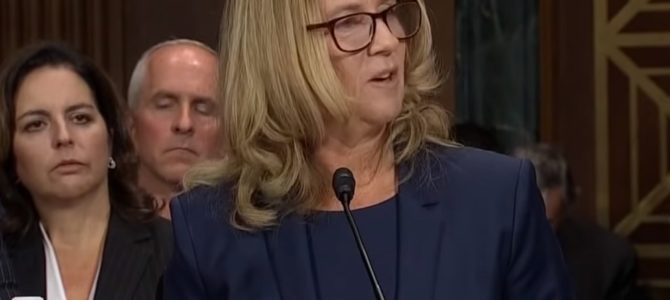Media Matters cast me as the mastermind behind a purported tinfoil hat smear in a blog post Monday headlined, “Pro-Kavanaugh conspiracy theory suggests Christine Ford hypnotized herself into creating false memory of assault by Kavanaugh.”
The story centers on a study about various therapeutic techniques for the treatment of depression, including hypnosis, which raised a red flag for some (including me) questioning her story. The flag has nothing to do, however, with her hypnotizing herself to create a false memory.
A co-author of the study is quoted by Media Matters responding to this self-hypnosis conspiracy theory, predictably saying, “The claims being spread about Ford and the study are ‘absolutely ridiculous’ and ‘the study had absolutely nothing to do with the creation of false memories, or the creation of memories of any kind.’”
“Ford was a statistical consultant on the report, not a participant in the study,” the co-author added.
Not since Ray Bolger skipped across the screen with Judy Garland has a more creative strawman been invented! Of course it is ridiculous to think that Ford hypnotized herself to create a false memory of her purported sexual assault by Kavanaugh! And no one to my knowledge has suggested that the study had anything to do with the creation of false memories or that Ford participated in the study.
Rather, as I explained at the time on Twitter, the study is significant because it establishes that Ford knows hypnosis and self-hypnosis provides clinical benefits. Specifically, hypnosis “assists in the retrieval of important memories” and can “create artificial situations” to allow a client to safely express emotions during therapy.
During last week’s Senate Judiciary Committee hearing, Ford testified that she suffers from anxiety and post-traumatic stress disorder. She also told senators that she wished she “could be more helpful with more detailed answers to all of the questions that have and will be asked about how [she] got to the party and where it took place and so forth.”
“I don’t have all the answers, and I don’t remember as much as I would like to,” Ford emoted.
This testimony, coupled with Ford’s knowledge of therapeutic techniques that could address both her memory problems and her anxiety — as well as her connection to professional clinicians trained in those techniques and likely knowing others similarly trained — raise the question as to whether Ford’s therapist hypnotized her. This question looms especially large because Ford has refused to provide the Senate Judiciary Committee with copies of her therapist’s records.
Republican Sen. Charles Grassley wrote Ford’s attorneys Tuesday renewing the Judiciary Committee’s request for the notes from the therapy sessions in which Ford discussed the alleged assault. To date, Ford’s attorneys have refused to share the information, claiming the “records contain private, highly sensitive information that is not necessary for the Committee to assess the credibility of [Ford’s] testimony.”
Nothing could be further from the truth. Ford’s testimony conflicted in several ways from the portions of her therapy session notes she willingly provided to The Washington Post. For instance, the notes stated the attack occurred in her late-teens and that four boys had attempted to rape her. And the excerpts she shared did not mention the supposed attackers by name.
But beyond these inconsistencies, the recent discovery of Ford’s co-authorship of a study that highlighted the clinical benefits of hypnosis and self-hypnosis increases the importance of Ford’s therapy notes: Those notes will reveal whether Ford underwent any form of hypnosis.
This fact is key because, as The Federalist’s Sean Davis — the other target of Media Matter’s smear — explained, the article Ford co-authored relied on other studies of hypnosis, including one that noted hypnosis as a means of recovering traumatic memories could lead to the “contamination” of those memories.” The study noted, “Patients are highly suggestible and easily subject to memory contamination.”
The potential for hypnosis to “contaminate” memories, or create false memories, has led some courts to bar testimony from witnesses who have undergone hypnosis. Other courts admit the testimony but allow a jury to assess whether hypnosis-induced recall is credible. (For those interested in understanding the scientific and legal dimensions of hypnosis-induced memories, the federal circuit court opinion in Borawick v. Shay provides a nice overview.)
While the Judiciary Committee is not a court of law, the senators should be equally concerned with the accuracy of Ford’s testimony. This means the senators must have access to Ford’s therapy records to determine the circumstances under which she revealed the supposed attack to her therapist, including whether she had ever been hypnotized. That’s not a conspiracy theory. That’s just common sense.









